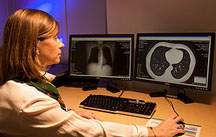Partnership highlights early lung cancer detection study for Lung Cancer Awareness Month
November 15, 2010
Lung cancer is Canada’s leading cause of cancer death, with over 20,000 deaths every year. Unfortunately, it has proven difficult to treat and still has a five-year survival rate of only 16% in Canada. November is Lung Cancer Awareness Month and the Canadian Partnership Against Cancer is marking it by highlighting its work identifying emerging technologies to improve early detection and treatment methods for lung cancer.
The Early Lung Cancer Detection Study is a collaboration between the Partnership and the Terry Fox Research Institute. The study evaluates the effectiveness of using questionnaires, breathing and blood tests to identify high-risk individuals. By using these tests to triage high-risk individuals, the hope is to help identify those who could be recommended for further follow up, should screening be found to be effective.
 “The Early Lung Cancer Detection Study is a practical approach that in the long term could make a real difference in how we screen for lung cancer,” said Dr. Stephen Lam, co-lead investigator, Early Lung Cancer Detection Study, Terry Fox Research Institute; Professor of Medicine, University of British Columbia; and Chair, Provincial Lung Tumour Group, British Columbia Cancer Agency. “In the short term, we are finding lung cancers that may have remained undiagnosed until later, and getting those people into treatment.”
“The Early Lung Cancer Detection Study is a practical approach that in the long term could make a real difference in how we screen for lung cancer,” said Dr. Stephen Lam, co-lead investigator, Early Lung Cancer Detection Study, Terry Fox Research Institute; Professor of Medicine, University of British Columbia; and Chair, Provincial Lung Tumour Group, British Columbia Cancer Agency. “In the short term, we are finding lung cancers that may have remained undiagnosed until later, and getting those people into treatment.”
Currently in the second year of recruitment, seven centres across Canada are actively recruiting participates. To date, 2,500 have completed their first testing. Overall, the study aims to determine who may benefit from further examination through computed tomography (CT) scanning – a more sensitive costlier test being studied internationally to determine its effectiveness in reducing mortality.
The use of CT screening for the early detection of lung cancer was the subject of a recent trial by the US National Cancer Institute. The preliminary results show that examining patients by CT is effective in reducing lung cancer deaths by 20% over the use of chest x-rays for screening and all-cause mortality was reduced by 7% in those given a CT scan. An anticipatory science team will be set up to examine current data and to be ready to examine the results of this study when it is published.
